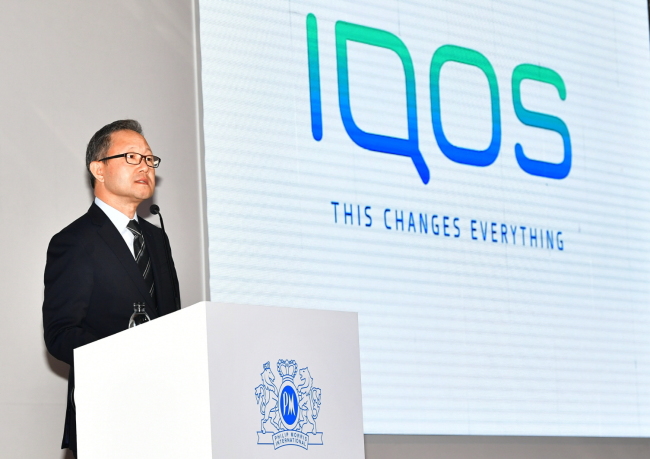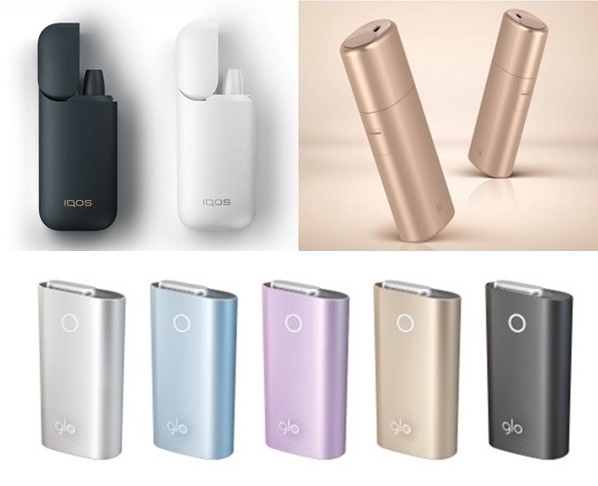HNB e-cigarette competition heats up for big 3 tobacco firms
From marketing to increasing production line and conducting clinical studies, tobacco companies butt heads in intensifying market
By Kim Da-solPublished : May 23, 2018 - 15:45
As interest and purchase of heat-not-burn e-cigarettes increases among South Korean smokers -- over 163 million packs of HNB cigarettes in less than a year --top tobacco makers operating in the country are engaged in a heated marketing war.
The fierce competition between the three major tobacco companies here -- Philip Morris International, KT&G and BAT Korea -- are entering phase 2 since their respective launches of the HNB products last year, with each striving to appeal to customers with different marketing, investment in technology and researches to verify their products.
Philip Morris International, which introduced the first HNB e-cigarette device Iqos to the domestic market in May last year, marked its first year anniversary on Wednesday.
The fierce competition between the three major tobacco companies here -- Philip Morris International, KT&G and BAT Korea -- are entering phase 2 since their respective launches of the HNB products last year, with each striving to appeal to customers with different marketing, investment in technology and researches to verify their products.
Philip Morris International, which introduced the first HNB e-cigarette device Iqos to the domestic market in May last year, marked its first year anniversary on Wednesday.

“I am pleased to see that our vision to replace cigarettes with science-based smoke-free products is becoming a reality in Korea. We will continue to lead this positive change by offering better alternatives to cigarettes for people who would otherwise continue to smoke,” said PMI Managing Director Chong Il-woo during a press conference on Wednesday.
The company said an accumulated 1 million adult smokers have switched to Iqos, contributing PMI to secure 7.3 percent of the HNB e-cig market share in the first quarter this year.
Industry data showed that in February alone, Iqos topped the list with 61 percent e-cig device market share, followed by KT&G’s Lil (32 percent) and BAT Korea’s Glo (7 percent.)
PMI also said that the domestically produced Heets -- e-cig sticks exclusively used for Iqos device -- will go on sales within this year, by injecting some 200 billion won in production at its factory in Yangsan, South Gyeongsang Province. It will be the first facility in Asia to manufacture heated tobacco units for Iqos.
On the same day, South Korean tobacco giant KT&G launched an upgraded HNB e-cig device Lil Plus, now with dual-heating and self-cleanse functions. Other new features include sleeker metal design, hidden LED and new color option, dark navy.
KT&G was the last to join the race for HNB e-cig devices. Since the launch of Lil in November last year, its e-cig sticks became especially popular for its compatibility with PMI’s Iqos device.

Meanwhile, BAT Korea, which launched Glo in August last year, announced earlier this month that it will release the upgraded Glo in August, strengthening the device’s battery life.
Separate from marketing tactics, companies are also striving to conduct extensive research including clinical studies. As tension with the government persists over the risks of HNB tobacco, companies like PMI and BAT Korea have been intensively conducting experiments that are reviewed by institutes like the US Food and Drug Administration’s Southeast Tobacco Laboratory to confirm the risk reduction potential of their e-cigs.
Due to mounting public calls, the Ministry of Food and Drug Safety is set to release the result of the safety test in June, which they focused on measuring the levels of nicotine and tar delivered by the HNB tobacco sticks.
Some industry insiders said that’s why the tobacco industry will invest more time and money on technology and science to prove their non-burning cigarettes as a safer option.
“Since promoting tobacco products is considered taboo in the Korean market, companies will have to juggle several balls at once. Two major things the companies will likely focus on is the development of the technology to improve the device for convenience and effective smoking, while the other will be investing in science to prove that reduced health risks are posed by their devices,” said an industry insider.
By Kim Da-sol (ddd@heraldcorp.com)


![[AtoZ into Korean mind] Humor in Korea: Navigating the line between what's funny and not](http://res.heraldm.com/phpwas/restmb_idxmake.php?idx=644&simg=/content/image/2024/04/22/20240422050642_0.jpg&u=)

![[Exclusive] Korean military set to ban iPhones over 'security' concerns](http://res.heraldm.com/phpwas/restmb_idxmake.php?idx=644&simg=/content/image/2024/04/23/20240423050599_0.jpg&u=20240423183955)

![[Herald Interview] Why Toss invited hackers to penetrate its system](http://res.heraldm.com/phpwas/restmb_idxmake.php?idx=644&simg=/content/image/2024/04/22/20240422050569_0.jpg&u=20240422150649)
![[Graphic News] 77% of young Koreans still financially dependent](http://res.heraldm.com/phpwas/restmb_idxmake.php?idx=644&simg=/content/image/2024/04/22/20240422050762_0.gif&u=)







![[Exclusive] Korean military to ban iPhones over security issues](http://res.heraldm.com/phpwas/restmb_idxmake.php?idx=652&simg=/content/image/2024/04/23/20240423050599_0.jpg&u=20240423183955)



![[Today’s K-pop] Ateez confirms US tour details](http://res.heraldm.com/phpwas/restmb_idxmake.php?idx=642&simg=/content/image/2024/04/23/20240423050700_0.jpg&u=)